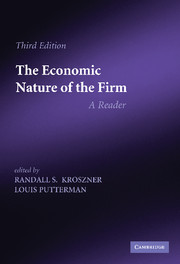Book contents
- Frontmatter
- Contents
- Editors' preface
- Reintroducing The Economic Nature of the Firm
- Part I Within and among firms: the division of labor
- Part II The scope of the firm
- Part III The employment relation, the human factor, and internal organization
- Part IV Finance and the control of the firm
- 19 Mergers and the market for corporate control
- 20 Agency problems and the theory of the firm
- 21 Theory of the firm: managerial behavior, agency costs, and ownership structure
- 22 Organizational forms and investment decisions
- 23 The rise in managerial stock ownership
- 24 Executive compensation as an agency problem
- 25 An economist's perspective on the theory of the firm
- 26 Ownership and the nature of the firm
- References
- References
23 - The rise in managerial stock ownership
Published online by Cambridge University Press: 05 June 2014
- Frontmatter
- Contents
- Editors' preface
- Reintroducing The Economic Nature of the Firm
- Part I Within and among firms: the division of labor
- Part II The scope of the firm
- Part III The employment relation, the human factor, and internal organization
- Part IV Finance and the control of the firm
- 19 Mergers and the market for corporate control
- 20 Agency problems and the theory of the firm
- 21 Theory of the firm: managerial behavior, agency costs, and ownership structure
- 22 Organizational forms and investment decisions
- 23 The rise in managerial stock ownership
- 24 Executive compensation as an agency problem
- 25 An economist's perspective on the theory of the firm
- 26 Ownership and the nature of the firm
- References
- References
Summary
Much of the vast research on corporate control over the past 30 years as well as many of the policy recommendations that have found their way into the securities law over the past 60 years are premised on the separation of ownership from control in public corporations. Thorstein Veblen first raised this issue in 1923 when he wrote of “absentee ownership” (Veblen, 1964). It was also the central concern of Adolf Berle and Gardiner Means in their hugely influential book The Modern Corporation and Private Property written in 1932. They warned that the separation of ownership and control “destroys the very foundation on which the economic order of the past three centuries has rested” and asserted that the “[d]ispersion in the ownership of separate enterprises … has already proceeded far, it is rapidly increasing, and appears to be an inevitable development” (Berle and Means, 1932) of the modern corporate system. More recently, academics such as Michael Jensen and Mark Roe have argued that a wide variety of tax incentives, antitrust policies, regulations, and political pressures, rather than anything inherent in capitalism, has led to the rise of what Roe calls “strong managers and weak owners.
Although the premise of the separation of ownership from management plays such a central role, little, if any, evidence has been presented to support the proposition that managerial ownership has declined over time.
- Type
- Chapter
- Information
- The Economic Nature of the FirmA Reader, pp. 313 - 326Publisher: Cambridge University PressPrint publication year: 2009

